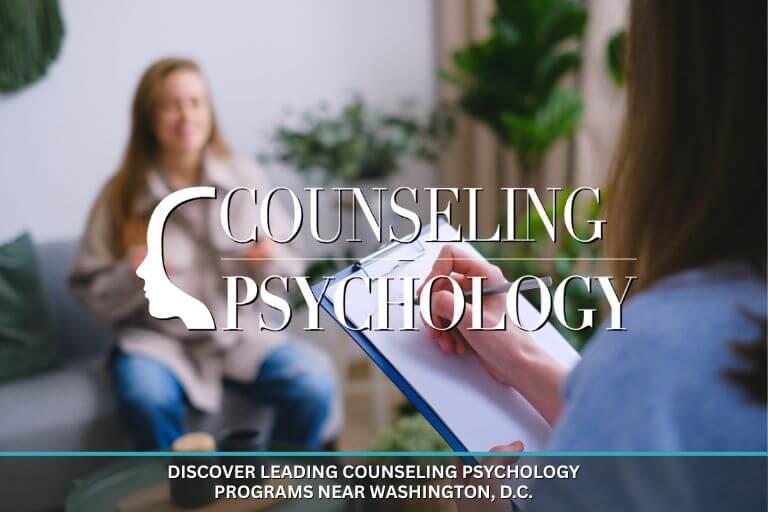Discover Leading Counseling Psychology Programs Near Washington, D.C.

Washington, D.C. the nation's capital and a nexus for policy, advocacy, and diverse communities, faces critical gaps in mental health services. The District had just 723 mental health providers per 100,000 residents in 2024, including psychiatrists, psychologists, social workers, and counselors. Despite being home to top universities and research centers, D.C. remains designated as a Mental Health Professional Shortage Area, with many wards underserved and long wait times for care. Meanwhile, the District boasts the highest concentration of licensed psychologists in the country, 144.1 per 100,000 people yet the absolute number of providers struggles to meet demand in school, community, and clinical settings, according to the American Psychological Association.
Aspiring counseling psychologists seeking rigorous, licensure-aligned training have numerous options in the D.C. metro area. Premier master's and doctoral psychology programs in Washington, DC, offered in hybrid or online formats, partner with local agencies such as the Department of Behavioral Health, school districts, and hospital systems to deliver robust practicum experiences. Graduates pursue roles in private practice, public schools, federal agencies, and research institutions. Read on to explore program levels, admissions criteria, career outcomes, and financial strategies before viewing our curated list of top counseling psychology degree programs near Washington, D.C.
2026 Leading Counseling Psychology Programs Near Washington, D.C.
Howard University
Washington, DC - Private 4-year - howard.edu
Doctorate - Ph.D. in Counseling Psychology
Campus Based - Visit Website
Howard University's Ph.D. in Counseling Psychology distinguishes itself through a comprehensive training approach emphasizing multicultural perspectives and mental health disparities. As a historically Black university, the program uniquely prepares scholars to address psychological challenges in diverse populations. Students engage in a rigorous 108-credit, full-time curriculum that integrates scientific research with clinical practice. The scientist-practitioner model enables comprehensive training in diagnostic assessment, evidence-based interventions, and complex behavioral dynamics. Faculty mentorship and research presentation opportunities provide robust professional development. GRE scores are required for admission, and the program leads to licensure eligibility. Prospective students must submit PSYCAS applications, transcripts, recommendation letters, and a research interest statement, demonstrating a commitment to advancing psychological understanding across varied cultural contexts.
- 108 credit hours
- Full-time program
- On-campus format
- Ph.D. degree
- Licensure eligibility
- Scientist/practitioner model
- Focus on diversity
- Faculty mentorship
- Research presentation opportunities
- GRE scores required
Why Study Counseling Psychology in Washington, D.C.?
Choosing D.C. for counseling psychology means training at the intersection of policy, cultural diversity, and high-need communities. The city's unique landscape offers:
- Policy-driven practicum sites. Intern with federal agencies, such as the National Institutes of Health, or local health departments.
- Diverse populations. Gain experience working with multicultural, multilingual clients in wards that reflect national demographics.
- Research opportunities. Collaborate on studies at institutions such as George Washington University and American University.
- Networking with leaders. Connect with practitioners at think tanks and non-profits shaping mental health policy.
Program Levels & Curriculum Overview
Counseling psychology training is available in the D.C. area at the master's and doctoral levels. Each tier balances theory, research, and supervised practice.
Master's in Counseling Psychology
A Master's in Counseling Psychology (48–60 credits) covers foundational coursework:
Before diving into specialized electives, students complete core sequences in:
- Human development and lifespan theories
- Counseling theories (e.g., CBT, person-centered, multicultural)
- Research methods and program evaluation
- Ethics and legal issues in U.S. clinical practice
Most programs require 700 or more practicum hours in community clinics, university centers, or federal agencies.
M.S.Ed in Counseling Psychology
The School and Mental Health Counseling Program Options (Ed.S.) track (60–75 credits) builds on master's foundations, adding:
- Advanced assessment techniques
- Supervision and consultation coursework
- Intensified practicum/internship (1,200+ hours)
- Leadership and program development
M.S.Ed graduates often serve as school psychologists or lead agency teams.
PhD/PsyD in Counseling Psychology
PhD/PsyD in Counseling Psychology programs (90+ credits) emphasize research, teaching, and clinical leadership:
- Dissertation research on topics from trauma to community interventions
- Teaching practicums at university counseling centers
- 1,500+ supervised clinical hours across diverse settings
- Preparation for licensure and APA accreditation standards
Admission Requirements
Before applying, assemble transcripts, test scores, and professional materials. Common requirements include:
Most programs ask for:
| Requirement | Expectation |
| Bachelor's Degree | Psychology, counseling, or a related field |
| Minimum GPA | 3.0 or higher (some accept 2.75 with experience) |
| Letters of Recommendation | 2–3 from academic or clinical supervisors |
| Statement of Purpose | Articulating counseling philosophy and goals |
| Resume/CV | Highlighting relevant work or volunteer roles |
| GRE | Often waived for master's; required by some PhD programs |
Interviews, writing samples, or personal statements may also be requested.
Career Paths & Specializations
Counseling psychology graduates can pursue roles such as:
Before you decide on a program, consider the specialization that matches your passion:
- Private Practice Clinician: Offers therapy services to individuals and couples.
- School Counselor/Psychologist: Implements mental health programs in K–12 settings.
- Federal Agency Therapist: Works at VA Medical Center, NIH Wellness programs, or military clinics.
- Researcher/Program Evaluator: Designs and assesses community mental health initiatives.
Practicum & Fieldwork Opportunities
Clinical experience is crucial for licensure and skill development. D.C. programs partner with:
Before entering your practicum year, explore these leading placements:
- D.C. Department of Behavioral Health: Community-based outpatient services.
- Local school districts: School-based counseling in Title I schools.
- Hospital systems: Rotations at Children's National Hospital or Sibley Memorial.
- Non-profit clinics: Sliding-scale services for underserved populations.
Salary Expectations in Washington, D.C.
Competitive salaries in the D.C. area reflect high demand and cost of living. Here's an overview:
| Role | Entry-Level | Median | Experienced |
| Licensed Professional Counselor (LPCC) | $55,000 | $75,000 | $95,000 |
| Licensed Marriage & Family Therapist (LMFT) | $60,000 | $80,000 | $100,000 |
| School Psychologist (EdS) | $65,000 | $85,000 | $110,000 |
| Counseling Psychologist (PhD/PsyD) | $70,000 | $95,000 | $130,000 |
Clinical psychologists in D.C. average $137,191 per year.
Financial Aid & Funding Strategies
Graduate education can be costly, but D.C. schools offer resources to reduce debt:
Consider these funding sources:
- University scholarships and fellowships, some specific to public service.
- Teaching and research assistantships with stipends and tuition remission.
- Federal loans and Perkins assistance are available through the FAFSA.
- DC Health Profession Loan Repayment Program for service in underserved wards.
Balancing Flexibility, Quality & Cost
When selecting a program, weigh key factors:
- Accreditation: APA-accredited or state-approved for licensure exams.
- Delivery Format: Online, hybrid, and weekend intensives to fit work schedules.
- Practicum Support: Level of assistance in securing quality placements.
- Program Length & Cost: Compare total credits and per-credit fees.
- Regional Partnerships: Strong ties to D.C. agencies enhance job prospects.
For regional comparisons, check Counseling Schools in Virginia and Counseling Schools in Maryland.
How to Choose the Right Program
Follow these steps for a strategic application process:
- Research program focus (e.g., school vs. community).
- Attend information sessions to engage with faculty and current students.
- Confirm licensure alignment and exam pass rates.
- Plan practicum logistics around your personal and professional commitments.
- Submit applications early to access priority funding.
Take the Next Step
Washington, D.C., offers a dynamic environment for aspiring counseling psychologists, combining policy, cultural diversity, and high-need communities. With premier programs, robust practicum partnerships, and funding opportunities, the District empowers you to launch a meaningful career serving local and national populations.
Begin your application today—D.C.'s communities are counting on your expertise.
Sources
- DC Health Matters – Mental Health Provider Rate dchealthmatters.org
- APA Monitor – States with Most Licensed Psychologists American Psychological Association
- Indeed – Clinical Psychologist Salary in Washington
- NIH – Psychologists Occupational Outlook Handbook
- KFF – Mental Health Care Health Professional Shortage Areas



